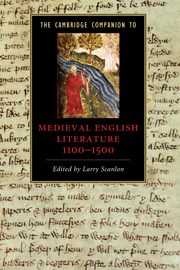14 - Thomas Hoccleve
from Part II - Authors
Published online by Cambridge University Press: 28 November 2009
Summary
One of the great pleasures of reading Thomas Hoccleve's poetry is the fact that we have reason to feel closer to a known individual than is often the case when reading medieval literature. As a clerk in the Privy Seal, one of the three great writing offices in Westminster, it was first of all Hoccleve's profession which ensured that he would appear in the surviving archival records of this period more frequently than many of his contemporaries. During Hoccleve's lifetime, the Privy Seal underwent a crucial transformation, leaving the king's household and becoming one of the machines for generating, tracking, and storing the vast quantities of documents that were necessary for the increasing extension of centralized state power. Many of these documents were receipts, and enough of these survive recording payments to Hoccleve to give us a good outline of his official career. Most abundantly, we find notices of annuities and grants stretching from 1391 to 1426. These annuities would have constituted the most reliable part of his wages, and they, in turn, would have been supplemented by small gratuities expected from anyone who needed to have a document produced. We also find reimbursement for supplies (ink, livery, and parchment) and two notices certifying the fact that Hoccleve had agreed to serve as mainpernor, the guarantor, for a fee, of a given individual's appearance at court. Lastly, the records register transactions relating to two corrodies, or guaranteed lodging in monastic houses often provided to aging servants. One of these corrodies was transferred in 1400; the other was given to an Alice Penfold in 1426, with the note that she was to hold it in the same way as “Thomas Hoccleve now deceased.”
- Type
- Chapter
- Information
- The Cambridge Companion to Medieval English Literature 1100–1500 , pp. 191 - 204Publisher: Cambridge University PressPrint publication year: 2009

